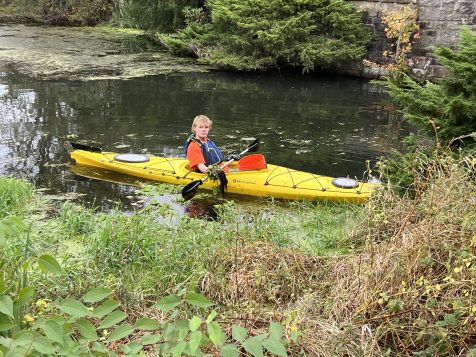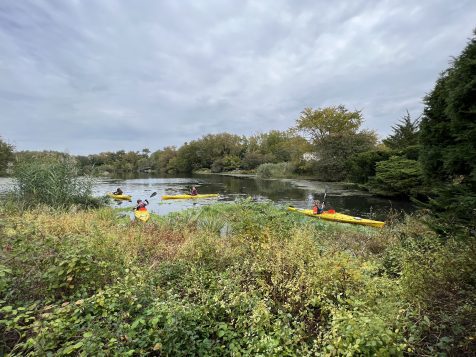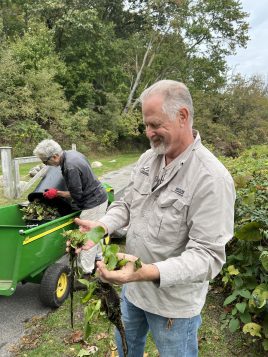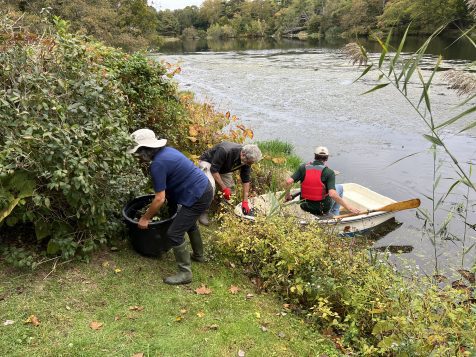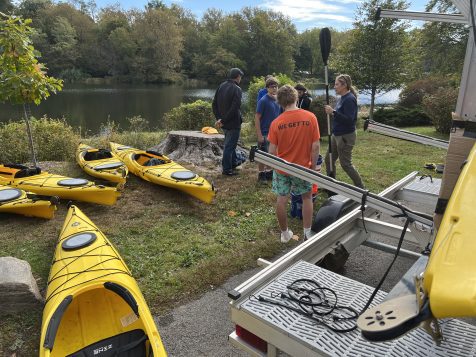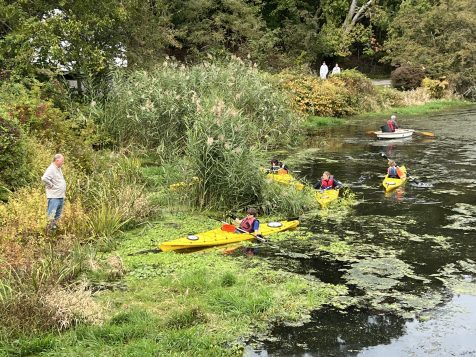Local volunteers recently took on invaders of the natural kind at Frank Melville Memorial Park.
Park volunteers and staff members joined forces with Four Harbors Audubon Society members and teen volunteers from Avalon Park’s Nature Initiative on Oct. 16. Their goal was to rid the FMMP pond of non-native and invasive aquatic plants.
Setauket-based environmentalist John Turner informed the FMMP board that water hyacinth and water lettuce in the pond were dangerous plants. It was the first time someone spotted them in the pond. Turner was leading the Nighthawk Watch at the park with members of the local Audubon society when the plants were observed.
The volunteers first went out on the pond via kayaks to pull, gather and bag the plants. FMMP trustee Luci Betti-Nash, who also is on the board of Four Harbors Audubon Society, was on hand for the cleanup. She said the team cleaned out the northern section of the pond and part of the southern portion. Betti-Nash said there are still more plants in the most southern portion of the pond. These, she said, will be taken care of at a later date. She added there is a possibility they may die off in the winter. If the winter is a mild one, the floating plants can potentially take root and survive.
“It’s important to nip it in the bud, get them out as soon as you can,” she said.
Within a month of the plants being discovered, Betti-Nash said, “they multiplied enormously.”
She said the teen volunteers have helped with cleanups in the park in the past to pull out invasive species, including vines such as porcelain berry and mile-a-minute, that take over trees.
Generally, the kayaks used by the teens this time around are not allowed on the pond, which Betti-Nash said made it more fun than past volunteer jobs.
“They really enjoyed it, and they did a great job,” she said. “They worked really hard.”
Turner said if the plants weren’t pulled out of the water, they could cause issues over a few years.
“If they’re not controlled and then eradicated within a fairly short period of time — probably within a year or two or three — the entire pond surface will be covered with these plants and create a whole series of adverse environmental conditions,” he said.
Among the detrimental ecological effects would be wading birds, such as egrets, green herons and belted kingfishers, which depend on visually seeing fish, not being able to find food to survive and feed their young.
“People just aren’t aware of the problem that these plants pose,” Turner said.
He added the plants, that are native in South America, have caused problems in the southern United States. The decomposition process pulls oxygen out of the water and leads to an excess of nitrogen, which happens often in Long Island and coastal waters.
“It’s of great concern, because it could adversely impact both turtles and, certainly, fish that would suffocate,” Turner said.
Betti-Nash and Turner said they only have theories as to how the plants wound up in the pond and no definitive answers. Many people use them for decorative purposes in their personal koi ponds. However, the naturalists are not aware of anyone dumping the plants in the park’s pond as sometimes happens when people get rid of aquarium products into freshwater ponds, which is not recommended. Seeds can also get stuck on birds and, when the animal lands, the grains can be introduced to an area, which is also a possibility.

